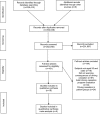Driving Cessation and Health Outcomes in Older Adults
- PMID: 26780879
- PMCID: PMC5021147
- DOI: 10.1111/jgs.13931
Driving Cessation and Health Outcomes in Older Adults
Abstract
Objectives: To determine what effect driving cessation may have on subsequent health and well-being in older adults.
Design: Systematic review of the evidence in the research literature on the consequences of driving cessation in older adults.
Setting: Community.
Participants: Drivers aged 55 and older.
Measurements: Studies pertinent to the health consequences of driving cessation were identified through a comprehensive search of bibliographic databases. Studies that presented quantitative data for drivers aged 55 and older; used a cross-sectional, cohort, or case-control design; and had a comparison group of current drivers were included in the review.
Results: Sixteen studies met the inclusion criteria. Driving cessation was reported to be associated with declines in general health and physical, social, and cognitive function and with greater risks of admission to long-term care facilities and mortality. A meta-analysis based on pooled data from five studies examining the association between driving cessation and depression revealed that driving cessation almost doubled the risk of depressive symptoms in older adults (summary odds ratio = 1.91, 95% confidence interval = 1.61-2.27).
Conclusion: Driving cessation in older adults appears to contribute to a variety of health problems, particularly depression. These adverse health consequences should be considered in making the decision to cease driving. Intervention programs ensuring mobility and social functions may be needed to mitigate the potential adverse effects of driving cessation on health and well-being in older adults.
Keywords: driving cessation; health outcomes; motor vehicle; older adults.
© 2016 The Authors. The Journal of the American Geriatrics Society published by Wiley Periodicals, Inc. on behalf of The American Geriatrics Society.
Figures


References
-
- Fonda S, Wallace R, Herzog A. Changes in driving patterns and worsening depressive symptoms among older adults. J Gerontol B Psychol Sci Soc Sci 2001;56B:S343–S351. - PubMed
-
- Marottoli R, Mendes de Leon C, Glass T et al. Driving cessation and increased depressive symptoms: Prospective evidence from the New Haven EPESE. Established Populations for Epidemiologic Studies of the Elderly. J Am Geriatr Soc 1997;45:202–206. - PubMed
-
- Ragland D, Satariano W, MacLeod K. Driving cessation and increased depressive symptoms. J Gerontol A Biol Sci Med Sci 2005;60A:399–403. - PubMed
-
- Bauer M, Rottunda S, Adler G. Older women and driving cessation. Qual Soc Work 2003;2:309–325.
Publication types
MeSH terms
Grants and funding
LinkOut - more resources
Full Text Sources
Other Literature Sources
Miscellaneous

